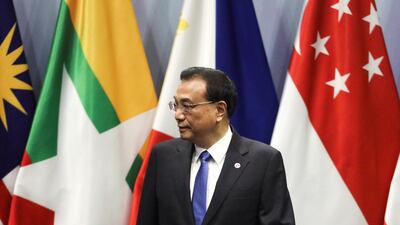For the Asean bloc, the South China Sea dispute is a top-priority regional security issue: six of the 10 member states stake claims to the contested waters.
None, though, are so sweeping as those made by China, with its "9-dash line". In the past three years, China has built a number of artificial islands, and signalled defiance at a landmark 2016 UN ruling in favour of the Philippines.
During the Asean summit in Singapore this week, member states agreed to continue work on a draft Code of Conduct, with a view to finalising it within three years.
The South China Sea has emerged as a potential flashpoint, with analysts voicing concerns over rapid militarisation, increasing belligerence over perceived territorial incursions, and ramped-up freedom of navigation operations. Observers fret that a war footing may be emerging in the contested waters.
Speaking to reporters on the sidelines of the summit, Philippines President Rodrigo Duterte said finalising of a code of conduct was crucial to clearly outline acceptable behaviour in the disputed waters.
"China is already in position. It's now in their plans. So any frictions, strong military activity, that will prompt a response from China," he said. "I do not mind everybody going to war, except the Philippines is just beside those islands and if there's shooting, my country will be the first to suffer."
In the past, Mr Duterte has conceded that to confront China militarily would be political suicide, as well as likely resulting in an outright "massacre".
""I am not prepared to lose my soldiers and policemen for simple adventurism," Mr Duterte told local press in June. The predicament has strained longstanding alliances, and in particular those with the US.
"Chinese island-building and militarisation is a fait accompli for the Asean states, especially in the light of the uncertain geopolitical orientation of the Trump administration," said Tan See Seng, professor of international relations and deputy director of the Institute of Defence and Strategic Studies.
"The Asean states may not like it, but they are resigned to it."
Speaking on background, a senior US administration official said the US would back calls for a binding code of conduct which would honour the rights and sovereignty of nations both big and small. They reinforced US commitment to the region, calling Asean "indispensable and irreplaceable" allies. Central to security, they said, were freedom of navigation, freedom of the seas and freedom of the air.
Addressing the 6th US-Asean Summit, US Vice President Mike Pence said: "We all agree that empire and oppression have no place in the Indo-Pacific."
In a speech delivered on November 13 in Singapore, Chinese Premier Li Keqiang called for co-operation in the region, seeking to allay fears about the exercise of outsized influence.
"We are not and we will not, seek hegemony or expansion. That is something we will never do," he said. "What we hope is to have a harmonious relationship with our neighbours and together we benefit from our good neighbourliness. There is a Chinese saying: a relative from afar is not as good as a close neighbour."
In a release from the State Department last week, the US called on China to withdraw its missile systems from disputed features in the Spratly Islands, reaffirming that "all countries should avoid addressing disputes through coercion or intimidation".
"The United States remains committed to fly, sail, and operate wherever international law allows," the department said.
Dr Huong Le Thu, senior analyst at the Australian Strategic Policy Institute's Defence and Strategy Programme, says that while US President Donald Trump's absence from the summit may be bad optics, Mr Pence would be seeking to reassert an ongoing role for the US in the region.
"Pence is likely to add some 'meat to the bone' on the Indo-Pacific strategy and particularly its economic component," she told The National. "He will need to counter the narrative that China and the regional actors are 'doing alright' without an external power."
The South China Sea is one of the world's most critical and valuable shipping routes, as well as being endowed with vast oil and gas reserves. It is also home to one of the most important — and ecologically imperilled — fisheries, which millions rely on for both livelihoods and a primary source of dietary protein.
In the absence of a binding code of conduct, observers are concerned that the race to exploit the sea's resources will strain relationships in the region.
While the signing of a code of conduct may be some years off, Dr Huong Le Thu says there are significant barriers, with Asean states "not ready to accept all of China's conditions".
The issue for Asean moving forward, Prof Tan See Seng says, is that any such code of conduct would be non-binding, with no enforcement mechanisms — and also does not define claimant demarcations in absolute terms.
He says this dogged pursuit of a code of conduct is "Asean's way of trying to establish a rules-based regional order and persuading their bigger regional neighbours, all locked in strategic rivalries with one another, to buy in and ensure some measure of adherence to commonly agreed upon rules and norms".
"It's seriously suboptimal, but it's pretty much what Asean can conceivably achieve given the huge impediments that stand in the way," he said.
The key variable is leadership, he said. “Can Thailand and Vietnam, the next two Asean chairs, keep the momentum initiated by Singapore going?"

